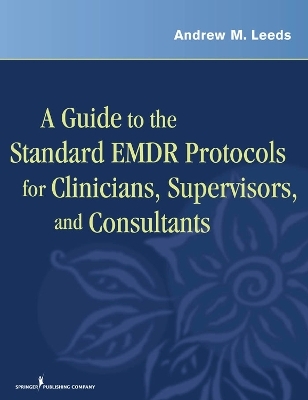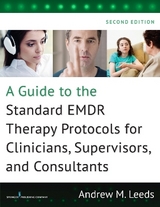
A Guide to the Standard EMDR Protocols for Clinicians, Supervisors, and Consultants
Springer Publishing Co Inc (Verlag)
978-0-8261-1551-5 (ISBN)
- Titel ist leider vergriffen;
keine Neuauflage - Artikel merken
The EMDR Treatment Manual is the first book to fully and clearly operationalize the clinical use of EMDR. It provides straightforward, concise treatment guidelines for practicing clinicians, supervisors, clinic directors, and hospital administrators. For researchers conducting treatment outcome studies, it provides manualized treatment guidelines and a fidelity checklist consistent with Francine Shapiro's standard reference text. ""The EMDR Treatment Manual"" provides a clear foundation for understanding the adaptive information processing model of Francine Shapiro. It does so by summarizing key concepts and terminology developed by scholars whose work preceded that of Dr. Shapiro and by integrating the research on EMDR relevant to the AIP model. In this way the book builds a conceptual bridge between the world of behavioral and cognitive therapies and the new neuroaffective paradigm implicit in the work of Francine Shapiro.
Andrew M. Leeds, PhD , is a California-licensed psychologist and marriage and family therapist with 40 years of experience in the private practice of psychotherapy. He practices in Santa Rosa, CA. He is the director of training for Sonoma Psychotherapy Training Institute, which offers basic and advanced training programs in Eye Movement Desensitization and Reprocessing (EMDR) therapy. Dr. Leeds received his BA in psychology with honors in 1972 from the University of California at Santa Cruz, an MA in clinical psychology in 1974 from Goddard College, and his PhD in clinical psychology in 1983 from International College. After early training in gestalt and somatic psychotherapies, Dr. Leeds served a 2-year internship as program coordinator for an alcohol abuse treatment program in Santa Cruz and received his license as a marriage and family therapist before going on to obtain his doctorate. During his doctoral program, he studied cognitive behavioral therapy, Ericksonian hypnosis, and self-psychology. Dr. Leeds received his initial EMDR therapy training in 1991 and became an EMDR therapy training supervisor that same year. In 1993, he became an EMDR therapy trainer. He has conducted basic EMDR therapy trainings for 15,000 clinicians at 140 training programs in the United States, Canada, France, England, and Japan. He has presented papers on EMDR therapy for regional, national, and international conferences. He is the author of a book, book chapters, and journal articles on EMDR therapy. He served for 2 years on the Standards and Training Committee of the EMDR International Association (EMDRIA) and for 3 years as an elected member of the EMDRIA Board of Directors. He presently serves as a member of the Editorial Advisory Board of the Journal of EMDR Practice and Research and, in 2013, was the guest editor for volume 7, issue number 3. He is an EMDRIA-Approved Consultant providing consultation to EMDR therapy clinicians around the world. Dr. Leeds contributed to the evolution of EMDR by articulating, publishing, and teaching the EMDR procedure that he named Resource Development and Installation (RDI). In 1999, he received an EMDRIA award for creative innovation in the development of EMDR as well as the Ronald A. Martinez PhD Memorial Award. In 2013, he received the Francine Shapiro award from EMDRIA.
Section I - The Conceptual Framework for Understanding EMDR; Chapter 1 - The History and Evolution of EMDR; Chapter 2 - The Adaptive Information Processing Model; Chapter 3 - An Overview of the Standard Eight Phase Model of EMDR and the; Section II - Case Formulation, Treatment Planning, and Preparing Patients for EMDR Reprocessing; Chapter 4 - Case Formulation and Treatment Planning; Chapter 5 - Assessing Readiness for Reprocessing; Chapter 6 - The Preparation Phase; Section III - Phases Three through Eight of the Standard Protocol for PTSD with the Standard Procedural Steps for EMDR Reprocessing; Chapter 7 - The Standard Protocol: The Assessment Phase; Chapter 8 - The Standard Protocol: The Desensitization Phase: Basic Procedures; Chapter 9 - Maintaining and Restoring Effective Reprocessing in the Desensitization Phase; Chapter 10 - The Standard Protocol: The Installation, Body Scan and Closure Phases; Chapter 11 - The Standard Protocol: The Reevaluation Phase and Completing the Treatment Plan; Chapter 12 - Cases Illustrating EMDR Treatment of PTSD.
| Erscheint lt. Verlag | 15.8.2009 |
|---|---|
| Verlagsort | New York |
| Sprache | englisch |
| Gewicht | 978 g |
| Themenwelt | Geisteswissenschaften ► Psychologie ► Test in der Psychologie |
| Medizin / Pharmazie ► Medizinische Fachgebiete ► Neurologie | |
| Medizin / Pharmazie ► Medizinische Fachgebiete ► Psychiatrie / Psychotherapie | |
| ISBN-10 | 0-8261-1551-9 / 0826115519 |
| ISBN-13 | 978-0-8261-1551-5 / 9780826115515 |
| Zustand | Neuware |
| Haben Sie eine Frage zum Produkt? |
aus dem Bereich



